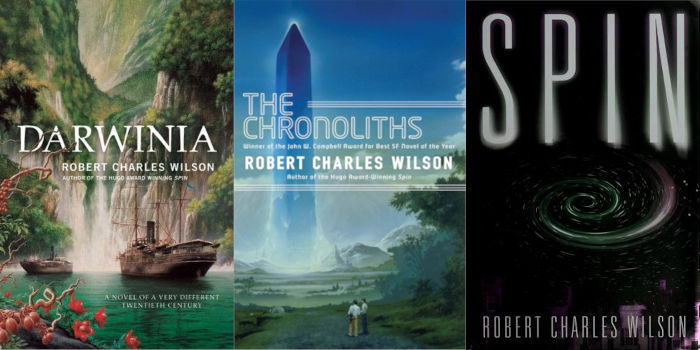Science fiction is a metaphor for the present. In the guise of projecting the reader into imaginary universes, sci-fi talks to us about ourselves. without cutting us off from reality. This way, it is utopia’s continuity, because since Thomas More it is about something else than portraying an exotic way of life for its exoticism. This is what distinguishes science fiction from fantasy.
Beyond George Orwell and Aldous Huxley, Kim Stanley Robinson’s Martian trilogy depicts us the construction of a dream being built, because Mars is one of the first places of “this place which is nowhere”. Utopian aims are permanent in these novels. The contact of the Idea and reality is a key to Iain Banks’ cycle of Culture, where Utopia extends to the stars. The journey to “boldly go where no man has gone before”, from a human society having achieved utopia, to seek out new life and new civilizations which will all decline ideal or horrible lifestyles, is very well known. Starting with Vulcan. Beyond that, think of a masterpiece like Ursula Le Guin’s “The Dispossessed“. Even with Philip K. Dick and the exploration of his inner torments, Mars, recently colonized in “Martian Time Slip” projects our contemporary world, and “The Penultimate Truth” is a real dystopia awaiting only a film adaptation. Readers loves imaginary worlds which more than often are a metaphor for the present. Ann Leckie’s Ancillary universe can also be mentioned as an example even closer to us.
Which utopia does Robert Charles Wilson portray to us, since he is a science fiction author? Spin is not a metaphorical projection of ourselves into a transfigured elsewhere, but a freezing of our present turned into a prison. What kind of sci-fi can it be, but something that hardly fits into ready-made definitions? In this essay, we will look for the ways Robert Charles Wilson renews a genre that has marked the literature of the past century. We will see how, often, these texts echo, repeat and modify themes which are most of the time far from utopia. We will show that from the start, it is a set of moving and endearing novels, which give food for thought and constitute a non prolific work, each element showing a real interest.
This article is intended for readers who are familiar with the novels we are going to study. It unveils or “spoils” a large part of the intrigues to analyze them. It is therefore not recommended to read this text if you do not want your pleasure of discovering a major author of contemporary science fiction to be wasted. On the other hand, discovering the novels with Blind Lake or A Bridge of Years would be a good idea, failing the Spin trilogy which is certainly better known, but much longer. But all these novels are very accessible, none of them is more difficult than another.
So, is there an utopia in Robert Charles Wilson’s science fiction novels?
- First Themes
- Beyond Utopia, figures of the father and links between the novels
- Religious dystopias
- Spin / Axis / Vortex : the trilogy
- The face of the Other
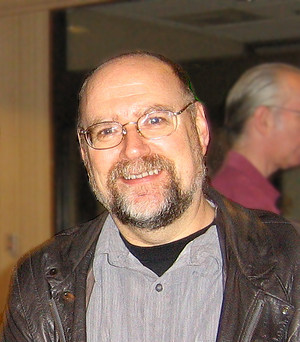
First Themes
The first novel, A Hidden Place (1986), progresses towards strangeness from a world that has nothing to do with an imaginary universe: America of the Great Depression, a society of misery and violence, without any uchronic dimension. Is it nostalgia? This kind of context is a recurring element, later texts will take place in such a recent past, at the end of the XIXth century or at the turn of the XXth century: Darwinia, Last Year… This first story brings together four characters and narrative lines by slowly bringing out supernatural elements which could have their place in a fantasy tale, moving away from the Steinbeck novel that we thought we read at the start. These characters are Travis Fisher and Nancy Wilcox, two young adults in search of themselves and their place in the very harsh and conservative society of a small town folded in on itself, where each one tries to fulfill his role, his persona, behind the facades of social life. Anna Blaise, pure femininity, occupies the static position at the center of the story; she is fully aware of herself and appears more and more clearly as an inhuman chrysalis (ch. 7). The bone, the male half of this otherworldly entity, roams freight trains with other destitute people, without a clear awareness of what he is and what the quest drives him.
Some central themes of the novels to come are already apparent, starting with the relationship of youth or childhood to the adult world and its wickedness. We will later study the omnipresence of the father; here, Travis has to deal with his uncle, Creath Burrack, “a deep pit of desires and fears … all buried, hidden” by the coming of age (ch. 14). He has made Anna his consenting sex slave and seeks to quell his frustrations with violence and wickedness over the person of his nephew Travis. The relationship with this adult firmly established in the society makes up all the intrigue, the “drama” of the novel, because Anna Blaise would evolve much more peacefully without him.
Then, we find the quest for themselves of these young people in conflict with the adult world we have just met, and an always positive and opened look at this youth which, here like in many of the other novels, is at the heart of the narrative. We will find this again, for example in The Chronoliths, Burning Paradise, and many others like the Spin trilogy.
Finally, we encounter the elsewhere, the strangeness, its suggestion more effective than its description, the presence of beings from beyond who are very rarely described and staged. This first novel is exceptional, because the story is also the meeting of this duality from another world, which we encounter in its so strange form. A being from elsewhere reveals something of the deep mysteries of life, behind appearances, to the humans who save it (the Precious World). These two young people put themselves in great danger to save this being, finding there the depth of their humanity. We will see how, in many of the later novels, these “supernatural” beings will become the very basis of a story in which they hardly ever appear. Here, on the contrary, many things are revealed about a mysterious world, deep inside of us, of which perhaps C.G. Jung, explicitly mentioned, holds certain keys.
Robert Charles Wilson does not need any utopian construction to develop this moving story with an opened ending, far from the classic themes of science fiction.
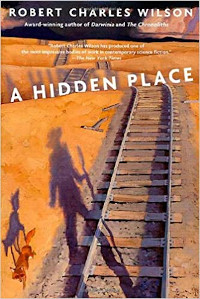
Later, A Bridge of Years (1991) uses another classic theme to subvert it. A long time has passed since H.G. Wells, regarding to time travel stories. There is no longer any question about a fantastic machine, nor of the discovery of a distant past or an ideal, utopian future. The novel begins with staging a classic theme of fantastic literature: we have to advance a lot in the narrative before understanding that, despite appearances, we are not dealing with ghosts in the house that Tim Winter has just acquired. More precisely, the place is inhabited, but by something much stranger than “ordinary” ghosts. Behind the walls of this house are beings we will never really meet, creators of a labyrinth of which we will see only a few guards through a single pair of doors, and there should be many others. But the owners are there. We will know almost nothing about them, their goals, their time, or their nature. The mysteries revealed in the very first novel are already closed.
This time travel does not take place for the curiosity of a historian, as Connie Willis does, or for an explorer of a future utopia, but as a kind of nostalgia for an universe nearby: New York in the sixties, without any uchronia. This nostalgia for a past America, maybe more pleasant, was already encountered in the previous novel, Gyspsies. In A Bridge of Years, Tim Winter drives us into a captivating story: there is an adventure, dangers and mysteries that will not be entirely solved. Even the bad guy is entitled to redemption, as he is a victim of a totalitarian universe to come, too shortly described for real dystopian construction. The hint is enough. He will experience a form of salvation in a still very opened and unexpected conclusion that time travel allows. There is no need to play with paradoxes: many other writings have already done so, the author knows how to take hold of a classic theme to make characters evolve in a really surprising way, until the end.
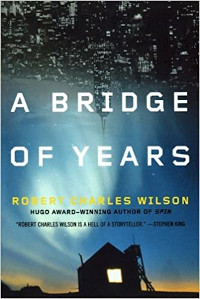
Another one of the early novels allows to pose central themes and to conquer a style: Memory Wire (1987), published during the cyberpunk era. As in A Hidden Place, Teresa Rafael, a woman traumatized by her father, gives rise to the whole intrigue, conquering its center as the story unfolds. The narration, the style of the author changes as this human, psychological stake unfolds, with Teresa always beyond the desire of two men. Alienation, dispossession of oneself due to memory implants transforming men into things according to a commercial contract, gradually goes to the background, behind this woman’s story. She is in contact with the strangeness, the elsewhere, a form of transcendence which has left only an incomprehensible trace of itself: the oniroliths. We evolve gradually from the thematic of William Gibson to that of Robert Charles Wilson, through a deep transformation of the narrative style over the pages. The conclusion of the novel emphasizes the innocence of Teresa which allows her to triumph over the villain of the history, to a world that is no longer a cyberpunk universe: these are the last pages of an moving story. There is still no utopia (or dystopia) really constructed, everything is about the human beings and their mutual involvement. It is not a political text.
Beyond Utopia, figures of the father and links between the novels
The relationship with the father is a major theme of almost all novels, and its numerous figures reflect the various ways of being a father with the problems implied, for the father himself but much more often for the children. We mentioned Travis Fisher and his uncle in the first novel. In Gypsies (1988), we meet orphan siblings having to endure the violence of an adoptive father, clumsily seeking to protect them. Very often, the biological father is a very authoritarian character, imbued with himself, his responsibilities, his career: ED Lawton (Spin) and Ray Scutter (Blind Lake) show how the author cares each time to build characters very different, but so realistic. It is difficult to find through this variety a figure of a loving, caring father devoted to his children. The various ways of being a bad one, concerned above all with himself, are strikingly described. The father of Adam Fisk (The Affinities) is a man disappointed by his son Adam, his brother being way much better able to ensure the family’s inheritance, assuming its very conservative and reassuring moral values. We can find many characters like this “best brother” in other novels, ones who may become tyrannical fathers with good intentions. Think of Karen’s husband, Gavin, in Gypsies. We meet him again in Axis with Brian Gately, Lise’s husband, a character imbued with social conformism to the point of caricature. In all these novels, the father’s person remains relatively in the background. Very often, the main characters had an abusive or absent father, who was anyway a problem, often because of the moral values this father cares about, like Turk Findley in Vortex. But the figure of the father becomes more central when he is not the biological one, and turns “his” child into his thing. Again, Robert Charles Wilson is much more concerned with human relationships and psychology than political constructions implying utopia.
The Devide (1990) is a far too little-known novel, swarming with later themes and ideas. It is more than just a pre-figuration of two more famous books: Darwinia and BIOS. Let’s quickly remark that neither of those latter develop an utopia, but on the contrary two journeys in a natural universe, in all its strangeness and its dangers. These are the only two texts that describe a journey in a hostile nature, almost all of the other novels (except perhaps Axis) taking place in a universe at least very urban, unnatural, because the subject remains, despite these few exceptions, the exploration of human and social relationships.
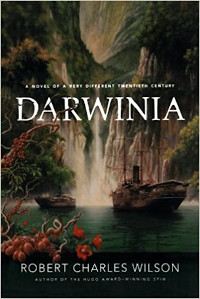
The Devide takes over the classic theme of the double, again an integral part of fantastic literature. There is no utopia in The Devide, at first because the plot takes place in our world and our present. Then, appears the virulent criticism of an Olaf Stapledon’s novel, Odd John (explicitly cited in ch. 8) – and it is no coincidence that one side of the main character is also called John, who has much better to do than build or lead an ideal society. His difference is based on his contempt for humanity he does not feel belonging to. “A man raised by monkeys does not become a supermonkey,” like Stapledon tried to show. What makes John in The Devide a super-human are the genetic manipulations he underwent during his growth in utero. His mother’s pregnancy had been bought by the one who will take the place of his father, and who wants to genetically improve humanity: Doctor Kyriakides. BIOS opens symmetrically: Zoe, the main character, is a human considerably transformed in laboratory for space exploration. We discover at the beginning of the novel how these modifications are sabotaged by the laboratory assistant who leaves her emotions and feelings intact instead of cutting them off: Zoe is some sort of a technical object, an improved human being made for the colonization of another world. Her emotions would hinder her task. In both novels, the father (who is not the natural one) supervises or operates these modifications in order to improve human. Thus, a large part of the two stories will explore the extremely difficult relationships with this “father” who took hold of a human being he turned into his thing. We’ll encounter such another character with Dr. Dvali in Axis who also experiments on a child, but who will however never be considered as a father.
How to live and grow up being your father’s thing? This father even has sort of a divine figure, as illustrated by the name of Zoe’s father, Avrion Theophilus, nicknamed Theo… Should we find here a classical root, since Freud, of the atheism we encounter in so many novels? The father’s figure is obviously so important for a human being that certain characters will live his absence as major trauma, like a deep wound explaining the drug addiction and other wanderings that Tim experiences, the big brother of the Gyspsies. To the point that he could see the man in gray, their lifelong enemy, as the one who “came closer than any other to Tim’s idea of a father” (ch. 17.2) and which will lead him to betray his whole family.
In The Devide, the trauma caused by hazardous “fatherly” experiences is such that John is only a part of a being who alternates with his double, which appears much more human, gifted with sensitivity and emotion, trying to have a life although he knows that another person shares his body. Let’s thinks of the duality of Darwinia, which takes on a cosmic dimension. These two novels seem like two forms of the same theme, the second somewhat transfiguring the first (even if the father’s theme is completely different in Darwinia). We could even attribute to another Stapledon’s novel, Star Maker, the “rough, uneven, with ridiculous well-meaning aspects” (ch. 8) that John in The Devide finds in Odd John. Robert Charles Wilson also builds some kind of metaphysics, with the vertiginous constructions of Darwinia, a little like Stapledon does. But the point is that both novels present two sides of the same person: who is the most human, the most endearing? The celestial twin, or the “real” Guilford Law, victim of the trenches of the First World War, brought down in an illusory uchronia to take part in a conflict which exceeds him? He who only asks to live in a world “which may not be utopia, but which is home” This quote is not Darwinia, but Gypsies (ch 17.3), written ten years before.
The main characters of BIOS and Darwinia have not been amputated of a part of their humanity; The Devide‘s very optimistic conclusion tells us how this “odd John” finds himself in finding his humanity. Darwinia clearly does not propose such a fusion, but concludes with the poignant portrait of a fully human being, Guilford Law at the end of his life. In The Devide, the duality of personalities is absorbed, in a contrary movement than the one we encountered in A Hidden Place. Again, there is a synthesis between two parts of the same being whose separation forms the whole story. But in The Devide, the two sexual parts do not merge towards the supernatural; there is a fusion between the “mental” and the “emotional” which make the true human being, not amputated of a part of himself by the experiments of a mad scientist who stole the father’s place (or utopia builders like in Vortex, see further). The ending is completely reversed because it is not a condition of a departure (or a return) to another world, but the possibility of a life in the normal world of humans, like in Darwinia. We even note the allusion to the depths of the ego, in The Devide as in the end of A Hidden Place (ch. 27 begins with a striking metaphor of the inner journey, with the conclusion in an abandoned warehouse). “What if this thing has been around forever?” “A true being, not invented” (ch. 30). The conclusion illustrates this gain in humanity: John saves Roch because he no longer wants to be like him, a non-human being, a foreigner because of his wickedness. Doing this, he saves himself and opens his life to the world, to others. Did Gilford Law ever asked something else to his celestial twin, a normal life?
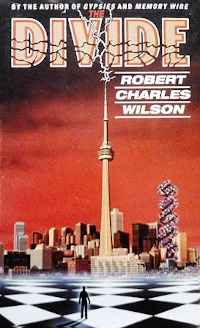
If the figure of the abusive and tyrannical father is omnipresent, some novels make exceptions, let’s think of he Harvest (1992) and The Chronoliths (2001) which echo to each other in several ways.
The first common point of these two novels are these mysterious stones, silent signs of a beyond, a might, a mysterious alien presence that left us something of him. We have already encountered them in Memory Wire and we’ll encounter them again.
Like the novels we met before, there is no utopia here, but the destruction of our world. In a completely radical way, first: what would we have to say to these wise aliens, infinitely superior to us technologically, who would ask us to be accountable for the cost of our way of life to our natural environment? What have we done to our planet? Julian will be built around the rubbles… The solution offered in The Harvest, taken on by a very large part of mankind, is the departure into a (possible) utopia out of Earth, of which we will know quite nothing about. The novel is about the very small number of those who refuse this escape, for many reasons, each one of them at the root of the psychology of one of the novel’s character. In a more nuanced but much more precise and maybe more disturbing way, The Chronoliths depicts the progressive destruction of our environment through many details: the depletion of water reserves in the USA, the technologies which tend to regress as the population is getting poorer and social problems are increasing (first pages of part three). As always, the opened and bright conclusions of the two novels expresses the optimism of the author despite the very dark content that preceded it. We will find these ecological considerations at the heart of the Spin trilogy. They narrow considerably Robert Charles Wilsons’ humanist optimism.
The other common point of these two novels is that for once, the story portrays non abusive fathers, despite their differences and the complexity of their life, their choices and their faults. Above all, they both shows concerns for their daughter. Scott, in The Chronoliths, does everything to make up for the mistake he made in abandoning his wife and daughter to witness the first appearance of a chronolith. He will save Kaitlin from an apocalyptic cult after a very dangerous journey. In The Harvest, Matt Wheeler chooses to stay on Earth, he refuses utopia. He has his city, his job and his daughter, which are all that matters to him. Unfortunately, he won’t save Rachel from her choice, she will become this kind of magnificent chrysalis, this butterfly of light, like the creature from beyond in the first novel. She will leave Earth to the elsewhere, leaving his father in a deserted but opened world, not closed by an utopian tyranny already built.

Religious Dystopias
We have seen how Robert Charles Wilson carefully avoids building utopias, but takes up a number of classical themes we also encounter in fantastic literature. In his intrigues dominates the psychological consistency of characters who are not there as stooges of an imaginary world, on the contrary. However, can a science fiction writer completely turn his back to the creation of utopias or dystopias?
If utopia found its mirror in dystopia during the XXth century, as a means of political denunciation of ideological totalitarianism, Robert Charles Wilson will take up this theme very sparingly to deal with the dictatorship of religion, in a very clear progression towards the questioning of Christianity and its ecclesiastical hierarchy. This will be done in three texts: Gypsies (1988), Mysterium (1994) and Julian (2009).
The relationships between Gyspsies and Mysterium are quite clear. The world where the Man in Gray (Gypsies) comes from is a double nightmare. On one hand, Europe is dominated by a Christian theocracy at war with the Muslim world. Descartes was hanged for heresy, Einstein and Heisenberg had to flee to America, in the Novus Ordo, to escape the Inquisition. The real villain of Gypsies is not this cardinal Palestrina, nostalgic for an original utopia, from an earthly paradise as we can see in the last pages of the novel. He was commissioned by the Vatican to seek help to the other side of the Atlantic, but he basically was “only a provincial bishop caught in a whirlwind of cases that overtake him” (interlude preceding part three). Europe sees in a sign of beyond a confirmation that the situation is hopeless: the face of the Prince of Darkness appeared in a cloud of toxic fumes (1 ° interlude, ch. 2). This detail will make the cover of Mysterium. The face of Alan Stern, the scientist whose experiments caused the major incident giving rise to the novel, will also appear on fumes above a huge burning of a gas station. In Gypsies, The Novus Ordo, one of the parallel Americas, is a continent of heresy where science and witchcraft merge, in particular with the Plenum Project searching to travel between worlds. Therein lies the worst nightmare, a gray, dull and wintry world, where an avenue of tall obsidian buildings leads to a gigantic sinister one with the emblem of the eye in a triangle: the government building and the headquarters of the Plenum project.
This project is carried out by mutants (including the fugitives at the origin of the plot) which Carl Neumann, true genius of evil, builds with the help of the heretic refugees from Europe. Dirac and Planck are cited. This heresy consists in the duality of the principles of reality and the plurality of worlds: these are exactly the Gnostic themes of the Mysterium theology, those which fascinate Alan Stern so much. He is also looking for the Plenum or Pleroma, the world of Light. Many quotes from his diary highlight the different parts of the novel. The scientific and technological background of the accident in Mysterium is created by an American (who has no bad intentions, as a scientist) while those who implement the religious dictatorship seem European, in particular French (the author seems to have little tenderness towards French people, as in Darwinia). There is in this American police state a metaphor that we will find again for example in Axis: “If genomic security could obtain the tools, it would have secret bunkers full of boys like Isaac connected to machines and under armed surveillance” (Axis, ch. 19).
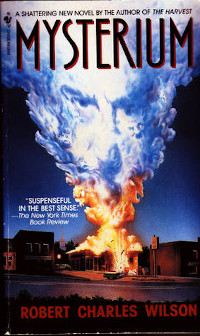
Mysterium presents a striking distorting mirror effect of the “classic” utopia with the meeting of two totally contradictory universes. Utopia is often like a sphere of unreality and perfection placed above our world. Robert Charles Wilson places a bubble of our world in a universe of totalitarian dystopia, and this way we appear as an “ideal world” for this dictatorship slightly behind our technological development. Our present then becomes like a fragile utopia which will be militarily colonized, starting with the women, to increase the power of a theocracy developing nuclear weapons. However, it is no longer the Roman Church which is at the head of this theocracy, but a rather strange religion, a Christian Gnosticism taking over the divinities of Greek Antiquity. This gnosticism is consistent with the metaphysical obsession of the physicist Alan Stern, it is even because of his beliefs that the small town of Two Rivers was transported in this dystopian nightmare from which the Christianity of Gypsies is absent, even if we just noted the deep thematic unity between the two novels. We encounter this connection again with the multitude of parallel worlds crossed by the mutants of Gypsies, which makes the very opened ending of Mysterium. The question is never about reaching utopia, but rather fleeing his opposite. The ending of both novels show the finding of a life in a world which is certainly not the best, but which is no longer the worst and where life can go on.
If Mysterium stages a curious Christian Gnosticism compatible with the traditional religions of Antiquity, Julian throws us into a not so distant future when a form of Christianity much closer to the one we know dominates all aspects of social life and authoritatively imposes a representation of the world which turns its back on science. As in Gypsies, the religious authorities rejects the way contemporary physics conceives the universe. But in this older text, the plot unveils itself in a parallel world. Julian stages our world in this inescapable future which follows the exhaustion of fossil fuels: our civilization has completely collapsed. The religious will take charge of the recovery of mankind in a reborn world, and thus takes place the erasure of scientific truth from the memories of men. There remains only a few traces, left in forbidden books unearthed from immense fields of ruins.
Could this ancient world, ours, survive, be revived? Would it be possible to restore the old truths? This is what Julian will try, and we read his biography. There is a clear allusion to the Roman emperor Julian the Apostate (331 – 363), who attempted to restore the old gods just after Christianity was made the Empire’s state religion . But there is above all an explicit parallel with Gore Vidal’s historical novel by (1964), which has the same title (as the French translation). Both novels portray the very complex personality of a ruler surrounded by defenders of the old world, and his uncertain struggles against a well-established, wicked, ignorant and greedy theocratic hierarchy. We can expose very further the parallels between the two biographies, one historical but romanticized, and the other fictional. Let’s just mention the storytelling mode, which is in both cases that of a witness, friend and companion of an outstanding character whose work will be doomed to failure. It seems that Gore Vidal like Robert Charles Wilson, each in their own way, warn us very clearly against the danger of theocracy, in particular Christian, with the uncompromising portrait of priests who are the worst of dictators, in the exclusive service of their own interests.
Julian is a much later novel than the previous two. The nostalgic and mystical quest for the Pleroma, a brilliant, marvelous but inaccessible universe, is left entirely aside in a vast metaphor which is above all about the fragility of the scientific spirit regarding to what humanity is capable of, in order to satisfy the mediocrity of its desires hidden behind “noble” ideals of transcendent salvation. At the same time, it is one of the very few novels in which we are trapped in a real nightmare, poignantly tragic and without much hope. The two other novels depicted very dark universes, without trapping the characters in the totalitarianism of an Idea, that is to say a utopia / dystopia. There was a plurality of realities, an escape was possible. Mankind was not locked in a closed universe. Unlike Spin.
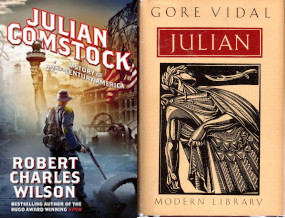
Spin / Axis / Vortex : the trilogy
Utopia and Dystopia are spheres of unrealities, mirrors and metaphors of ourselves which seduce us with their imaginary contents, as charming or horrible could they be. These are escapes that gives us to think. Spin‘s tour de force consists in enclosing ourselves in a bubble of our present, of ourselves, cutting us off from the future as from any other world, condemning ourselves to Earth in the perspective of a near final conflagration: the death of the Sun is approaching, because the time out of this impossible bubble is passing at a very high speed. There is no future anymore. This is the universe of Spin, at least the one mankind have absolutely to escape from.
Is there a more radical alternative to utopia? The trilogy will however consist in a slow movement towards the search for the ideal, including forms of social organization, seeking to understand, to give meaning to this impossible event, to find its mysterious author.
Our world therefore finds itself cut off from the stars in a hostile, foreign night, imposed by a silent, untraceable power. This is the world in which Tyler Dupree and the Lawton twins grow up: a silent meaningless cataclysm, the expectation of an inevitable apocalypse during which life must go on. If human inventiveness hopes finding a solution, it will still not be in any utopia. Jason Lawton invites his childhood friend Tyler, the narrator of the novel, as a doctor to the scientific research complex where there may be a loophole in the prison. Even such a complex is not utopian, Robert Charles Wilson takes pleasure in multiplying significant details of a perfectly trivial daily life that cut us off from the brilliance of the Idea. Let’s take a closer look: when Tyler flies to Florida to meet his friend, his next passenger in the plane is a Russian who orders whiskey. The rental car the next day has two holes in the door. On arrival, the heat seems to rise from the ground, “the wet earth sweating like a beef breast on a barbecue” (Ch. Troubled nights). Utopia? In Axis, the plot takes place on another planet, already colonized for some time, under the UN administration. There is nothing in this society that has the slightest utopian character, not even the natural environment. If the flora and fauna is nothing exotic, the alien flowers are called “red whore’s-lips”. The urban environment is completely familiar to us, in a colonial fashion.
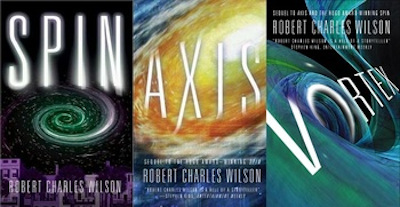
Let’s go back to Spin. Jason Lawton, already ill, is working on an incredible project made possible by the temporal confinement of Earth: the terraforming of Mars, remotely. And it works. With such time scales, Mars will come to our rescue. We are going to be saved by utopia … Nothing could be more illusory.
Mars is not an utopia, it experiences natural disasters like devastating floods, and also corruption, because Martians are humans. A traveler from Mars comes to Earth, and may bring to us a solution which also concerns Mars, because a Spin also formed around the former red planet. Wun Ngo Wen shows us four personal photos of a world that may have great ethereal towers, but they would collapse under Earth’s gravity. Mars is not an ideality. The Martian lost his family in floods, which is in a way quite trivial and revealing of the fragility of this world. And all in all, what most resembles Mars is Ohio depicted by … Ray Bradbury! Where is the utopia? In the look we have on it, in the reciprocal glimpse that Mars and Earth have at each other. It may be disturbing to realize that the timeless bubble of ideality which crosses all of Martian history is ourselves, awaiting the salvation of Mars, that we hope to be utopia under construction. We will discover that Mars has a whole history of violence and wars, not unaware of corruption. Because Martians are humans.
Spin is a brilliant novel, particularly endearing by the depth of characters confronted with a world which remains very much ours, including its very ordinary political vicissitudes. Axis mentions utopia, but absolutely not to build one. Many groups of Fourth Ages are scattered on the planet, the novel just evokes them, staging the life in a vacuum of a group of researchers around Dr. Dvali. Vortex is the novel presenting an ideal city, its history, its organization and its death.
Vox, the city in the novel closing the Spin trilogy, is a magnificent architectural bubble laying with its archipelago on the ocean. She travels from world to world in search of the Absolute. We will never see it intact, but already partially destroyed by a nuclear attack (the novel is set ten thousand years in the future). The society folded behind these walls rests on the slavery of “sub-men” who feed the city by their work in the countryside around. When they revolt, quite at the beginning of the story, they are massacred by an weaponry leaving them no chance. It does not seem that mankind of this distant epoch has reached anything consistent with our idea of justice, any more than individual freedom.
In this distant future, there is not one perfect society, but a plurality who claim to be and go to war against each other. Is this new? Vortex portrays us a humanity that is still far from a solution to conflicts between social models. Two types of society consider themselves perfect, each one based on a part of human nature: “cortical” rationality, or the deeper, intuitive and emotional “limbic” aspect. Let’s remember that The Devide pointed the fact that an individual is the fusion of both, but Vortex notes the failure of such utopian endeavours based on what the human being really is. Vox is grounded on the second “limbic” principle, but it seems that in both cases, utopia implies the abandonment of large parts of human individuality. This is clearly related to ecological considerations. The Earth, in Vortex, is dead, destroyed by the unbridled and unregulated consumption of a multitude of individuals: humanity has consumed oil from two planets on one. Environmental concerns, which are completely obvious, lead Robert Charles Wilson to pose the problem of utopia : could it be a solution? The Harvest already did so. Is it possible to reconcile individual freedom and the salvation of our planet? What could be the future of democracy, of the model of society we know? Vox’s utopian response is a fusion of consciousnesses, of individuals, according to a social and ideological model supported by an Artificial Intelligence that regulates minds and behavior, the Corypheus. “The sum of our best instincts – which is just another name for the Corypheus – knows that rationing is necessary and fair. So much so that as individuals we feel it necessary and fair” (ch 16). Thus, each one carries an implant which makes him part of a larger whole, regulating his personality, in which his individuality gets dissolving. Then, the novel goes through this ideal society in which each one feels with the others, understands the other in a much deeper way than we do. We are presented with the shared anxieties of a population which, curiously, still experiences many forms of violence and murder.
Then, what is such a society worth, as it is impossible to deposit on the reality an ideal bubble which could be viable? The answer is very clear: “No offense, but do you not have the impression that a conscience who is capable of rationalizing genocide may have a problem?” (Ch. 24). What terrifies Turk, whose mind is merging with this collective entity, is to understand very soon the reasons behind the massacre he witnessed when he arrived in Vox. In other words, losing all effective moral judgment.
Utopia is totalitarianism, a programmed, agreed and then imposed moral blindness, and the negation of what makes our humanity. Utopia and dystopia are two faces of the same reality. Is the idea new? Probably not. Robert Charles Wilson devotes only one novel to stage the fractures and the death of a splendid crystal bubble in a very distant future.
After Spin, two novels will take up the theme of Utopia, still very critically.
Last Year is a caricature: an impossible architectural spire laying in the middle of the desert, transported by men of the future at the end of the 19th century. Envoys of the future, coming to offer the benefits of tomorrow’s civilization to their ancestors. We find again the idea that utopia is only in our eyes, when we are outside it. A perfect, wonderful, impossible universe only makes sense for those who cannot understand the underlying technology that defrauds them. This technology itself has been stolen from their creators, men from an even more distant future. From them, once again, we will learn almost nothing. The masters of this rigged utopia are sent to justice for financial embezzlement. Once again, we witness a father’s desperate attempts to save his daughter who abandoned him because of his immorality. If there is an uchronia, in particular in this multitude of parallel universes to which we return after Spin, Robert Charles Wilson shows himself again very attached to historical accuracy in placing his novel in the context of the 1877 riot in San Francisco.
The Affinities depicts a multiplication of idealities which are the magnified human relationships at the age of global social networking, which is ours. It becomes possible to find not only a soul mate, but an entire network of people compatible with our personality, our character, and to constitute an ideal sub-society. Hence, the whole society is fragmented into structured subgroups of people who get along very well with each other, as if they were made for one another. This idea leads to a very dark world. Firstly, the ideal city, the perfect place in no place, is ultimately reduced to a simple house, from which the narrator of the novel is excluded because he no longer conforms to the criterion of belonging to his group. But above all, these competing groups end up fracturing the global social fabric. There is no longer an ideal city, but idealized human relationships, a large number of hegemonic projects, more or less aggressive, coming into conflict. Isn’t that what Vortex was already staging? We don’t even need a city anymore to stage the dangers of utopia.
The Affinities exposes a new way of building science fiction at the heart of our present, by means of a very simple speculative element that can turn everything into a real nightmare. Here as elsewhere, the power of such a construction is based on the psychological depth of characters whose life changes for reasons beyond them. These reasons are, for once, purely human.
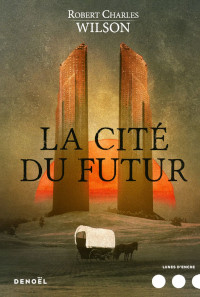
The face of the Other
So, Robert Charles Wilson does not focus on utopia. As a Science fiction writer renewing a literary genre which carries on a long history, he will take hold of one of the most awaited themes: the extraterrestrials, that is to say of the Other, the Stranger. This theme will be renewed in depth, in a very personal way. The stranger also means the strangeness, which begins with the feeling of a presence that fantastic literature, again,knows well. Science fiction, in particular in movies, developed this theme even before Star Trek, where extraterrestrial civilizations are countless. Closer to us, from Alien to Avatar and E.T., a lot of “strange strangers” are met. Let’s see how our author makes very different choices.
The novel in which we most clearly encounter an extraterrestrial civilization is Blind Lake (2003), just before Spin. Throughout his work, we have seen Robert Charles Wilson returning to themes he previously used. If Blind Lake was, unfortunately, only nominated for the Hugo Award 2004, it may not have been noticed enough that it prefigures Spin. We find in the two texts a closure, for reasons remaining incomprehensible for a very long time. This barrier extends from a small town to the whole planet, let’s remember the “transfiguration” from The Devide to Darwinia.
A central questioning in Blind Lake is about the purpose instituted by a conscience that we feel obliged to attribute to those extraterrestrial beings who are intelligent, inhabitants of a big city that they built, engaged in very mysterious activities. Wrongly called “lobsters”, they are profoundly different from us beyond their bipedalism. They must be similar to us, despite their strangeness, and most of all despite the absolute prohibition of all anthropomorphism as long as we are engaged in scientific research. Why ? What do they want? What are they doing ? Who are they ? Marguerite Hauser spends her days observing these extraterrestrials, she struggles with this problem as a researcher, writes a private newspaper depicting the life of this Subject by making it “human”, finally risking her career by publicly exposing the justifications for a form of anthropomorphism. A tale. Fundamentally, she can not help but attribute an understandable meaning, a goal, to what she observes even if it goes completely against scientific methodology. “The natives are indeed people, intellectually close to humans and morally equivalent to them, this also implies that the best way to build their narrative is to refer to ours. Even if the comparison is not always to our advantage.” (ch 22.) There will be a lot of people in the Spin trilogy seeking for a purpose, a meaning, a finality.
Further in the novel, Marguerite Hauser exchanges, communicates, transmits a story with this extraterrestrial, beyond the abyss of space and time, beyond the light years that separates us from his world. By what miracle?
These observations are made possible by other strangers, who inhabit the machines that allow us to observe these distant worlds. The researchers at Blind Lake and the associated laboratory no longer understand how their own machines work. It is said from the start that they do not understand how their instruments allow us watching inside the buildings of a distant world, to see how the Subject lives, wakes up, goes to work, and finally talk to him. The reason is that these O/BEC instruments have been colonized by other foreign beings: humanity does not realize this until the end of the novel. There already is a presence on Earth, which seems peaceful, from which we will learn very little. but who has already contacted us. Very old, they swarmed in the universe and made contact on Earth through the spirit of a child, Tess, the daughter of Dr. Hauser. How not to think of Isaac in Axis?
But Tess in Blind Lake is not the product of random in utero manipulations committed by a scientist “a little bit disturbed” (Axis, ch. 11), and maybe Blind Lake ends up where Spin begins: there is an extraterrestrial presence among us, it is obvious, we are not alone, but they remain silent and we are overwhelmed by their power. We see Tess and Isaac banging their head against the walls while undergoing this mind invasion from a power that will remain wordless, at least when it comes to his nature and his motivations.
The same question remains: what do they want? This question assumes that we are dealing with sentient beings capable of achieving ends, and not just a simple process going on. But that raises the question of the authors, the designers of such a process implemented in machines. Can we understand them instead of just undergoing the power of this process.
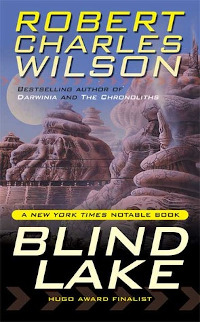
This highlighting of our limits behind the power of the Other, the Stranger beyond our understanding, very often takes the shape of an event which gives rise to the novel itself, an event from which the story unfolds. Something impossible happens, which surpasses us if not transcends us, and changes everything: the discovery of the oniroliths in Memory Wire, the arrival of a powerful space ship in The Harvest, the silent displacement of a small town to another world (Mysterium). Europe was replaced one morning by another continent, the unknown world we will name Darwinia. A gigantic black stone inexplicably materialized, the first of a whole series, in The Chronoliths. A barrier materialized around our planet and cuts us from the stars in Spin. A mysterious rain of impossible wreckage falls to the world, in Axis (with the difference that the whole story will develop the expectation of the event itself, which will remain as completely alien in its meaning, providing it has one). Who did this, who is responsible for the impossible? That, we will not always completely know of. The cause of the Event will often remain partly hidden, as this is not a police investigation. But maybe in a fantasy novel ?
The strangeness of this presence is sometimes reinforced by a silent trace of mystery: a black stone, a monolith, something from elsewhere, whose origin will forever remain incomprehensible, unknown. And yet the stone transmits something of this elsewhere by the simple power of its dark presence. A memory Arthur C. Clarke?
These silent stones coming from an impossible beyond, by the standards of our upset daily life, are one of a haunting form for many of the characters in the novels, often in search of the absolute. Scientists are obsessed with their research in which they are fully invested. They are searching for the meaning of the world, of things, as far as this meaning must exist, as we saw in Blind Lake. In Mysterium Alan Stern is a brilliant physicist involved in Gnosis, that is to say a mystical representation of reality hardly compatible with quantum physics. He reaches an unforeseen, unfortunate result, of which he will be the victim himself. We will then meet very strange beings, learning almost nothing about them: no communication, no words with these shapes of light, just a glimpse in the forest. They remain others, strangers. In The Harvest, all communication is, from the start, impossible. There is a ship, they sent us stones after putting us in front of a choice in their single message. We will know nothing about the stones, beyond their origin. The silent starship. Sometimes, we even don’t know that much.
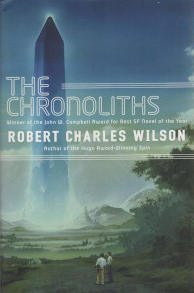
All the themes we encountered will gather in Axis: a scientist obsessed with this quest for the absolute will transform a child before birth to make it a means of communication, a bridge to the aliens. There must be a sense, an intelligence at work behind these machines, the Hypothetics must have a will, a form of conscience, instead of being just a process. There must be a way to go beyond this very name we have given to our ignorance, to this great mystery that remains, to those beings who continue to ignore us even though they have changed everything. Do they have a conscience that makes them able to set a finality, a meaning? There is no doubt about that for Dr. Dvali who does not shy away from a crime against the person of Isaac, still a fetus, in order to have a contact satisfying his belief. He will not reach this end, because the child will reject him, in the meaningful conclusion of the novel.
But he wouldn’t reach such a mystical experience, anyway, because there is no one to contact. The mystical aspiration hidden behind this obsession of meaning that drives the seeker is pointless, and the utopia of Vortex will end up devoured by powerful indifferent machines that have tirelessly accomplished the same task for millions of years. The term replicators from Stargate is used to describe Martian machines in Spin, but it applies as well to these Hypothetics, which are only a blind mechanism, interested in life only as it allows it to grow further, always without any conscious purpose.
Some forms of consciousness have certainly been able to develop within such a network, as old and immense as our galaxy, for example like survival forms of beings “assimilated” within it. But aren’t they just the memory dead people, like Jason? Beings like Isaac himself in Vortex will be able to use the Hypothetics to leave Earth and escape its destruction in a utopia he will be the only one to live in. Robert Charles Wilson places us in a universe without God. Meaning is in life with our other humans, here and now.
All this does not mean that there are no other presences, that the universe does not contain mysteries which may inhabit us, presences that lurk in darkness for reckless explorers. Are these presences necessarily malicious? A Bridge of Years, one of the first novels and maybe one of the best, concludes with the evocation of a presence that remained in the background all along a dangerous story, only revealing itself for a few moments to allow one of these opened, optimistic endings for a brilliant and luminous novel.
Is science fiction a metaphor for the present? Does Robert Charles Wilson’s work fall into this category? The answer is apparently negative for a large number of his novels, even if the lucid ecological warnings he gives us can be seen as a form of utopia. Our initial definition does not work very well after all to describe a modern set of novels, which really brings something new to a genre already old. Should we not see this as a sign of renewal brought to us by Robert Charles Wilson with a deeply engaging work?
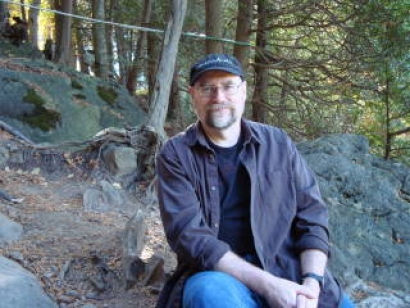
Yves Potin
